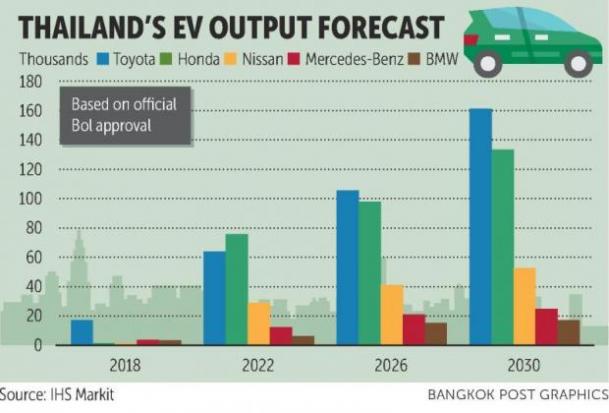Thailand – IHS: 600,000 EVs here by 2030
London-based IHS Markit, a global information provider, forecasts the overall electric vehicle (EV) fleet in Thailand to reach 600,000 cars by 2030.
Thailand is the major EV market in Southeast Asia, where the total is expected to hit 900,000 cars regionally in the same time frame from 40,000 projected in 2018, said research analyst Siri Kanjanasiri, speaking at a seminar on EV adoption held by PTT Plc.
“Demand for all EV types will be robust through the longer term, led by two hybrid versions,” Mr Siri said. “Even though both hybrid and plug-in hybrid EVs are still a limited amount of the local market, the penetration of the two versions is expected to represent 15% in 2025 and 21% in 2030, while battery EVs will account for just 2% by 2030.”
Mr Siri said IHS estimates that all EVs in Thailand will have a compound annual growth rate of 80% during 2016-20 before normalising to 12% in 2021-25 and 7.4% in 2026-30.
Furthermore, IHS has an upbeat view of the EV market in Thailand because of attractive policies and infrastructure development.
The government has offered EV promotional privileges in the hope of enticing carmakers to invest in local manufacturing facilities.
The Board of Investment has approved six EV applications, from Toyota, Mercedes-Benz, BMW, Honda, Nissan and the latest, SAIC Motor-CP, which won privileges earlier this month.
The three Japanese companies are bullish on localisation of hybrid EVs, while the two German brands and the Thai-Chinese company are pushing plug-in hybrid EVs.
FUZZY ROADMAP
But Mr Siri said the EV perspective for both Thailand and other regional countries remains unclear when compared with developed markets that have set an ambitious roadmap of CO2 reduction, declining diesel consumption, restrictions on internal combustion cars in some urban areas and support for massive production of EVs.
In Southeast Asia, by contrast, policymaking is focused mostly on adopting emissions standards. For example, Thailand has the Euro 4 standard and an excise tax calculated on the basis of CO2 emissions, while Indonesia plans to announce low carbon emission regulations later this year.
For the global outlook, IHS estimates that EV output will surge from 5.5 million cars in 2018 to 60 million in 2030.
“China is taking the lead as the largest EV market and producer, with 26.6 million EVs by 2030, up from 1.2 million in 2018,” Mr Siri said.
Source: https://www.bangkokpost.com/business/news/1542526/ihs-600-000-evs-here-by-2030


 English
English




